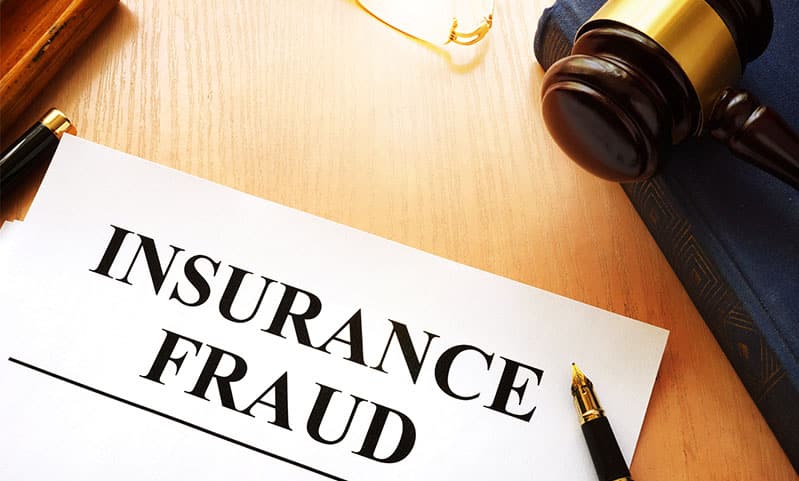People engage in insurance fraud through many means. From staged accidents and injuries to fraudulent schemes aimed at saving money for insurance companies, their fraudulent activities cost insurance providers money while opening them up to criminal prosecution – ultimately impacting us all.
Investigators can uncover evidence of potential insurance fraud by interviewing witnesses in an environment free from distraction and asking specific, detailed questions that require detailed answers. It’s also essential that investigators utilize entirely legal investigation tactics.
1. Fraudulent Claims
Insurance fraud threatens the benefits of insurance by enabling dishonest people to gain financial advantage at someone else’s expense. From staged car accidents and false workers’ comp claims to arson for profit and fake death and life policies – fraudulent claims cost over $80 billion annually while raising premiums across the board.
For businesses to effectively combat fraud, teams should institute an efficient customer onboarding process that verifies both the identity and personal details of customers. Furthermore, all team members – not only claims or underwriting professionals – should be informed on common insurance scams so they can quickly identify red flags – such as when the language used during interviews does not match someone’s typical style or mannerisms of speaking.
2. Fake Insurers
Insurance fraud is a pervasive issue that affects every consumer. According to the Coalition Against Insurance Fraud, fraudulent claims cost Americans an estimated annual total of $308.6 billion.
Insurance companies should put safeguards into place to detect and deter fraud. These can include KYC/due diligence checks to make sure customers are who they claim they are from the start of their relationship with an insurer.
Consumers can also commit insurance fraud by staging theft or accidents that would be covered under their policy; exaggerating claims; or engaging in premium diversion (when an agent embezzles their client’s insurance premium). Unfortunately, all consumers bear the costs associated with this fraudulent activity in higher prices for goods and services and higher insurance premiums.
3. Individuals Within the Insurance Industry
Insurance should provide people with financial security in case of accidents, injuries, or property loss; but fraudsters have used its system to steal from innocent citizens and businesses alike. Such individuals may lie on an insurance application form or exaggerate claims to fraudulently gain money they don’t deserve.
The Coalition Against Insurance Fraud estimates that fraudulent activities cost Americans at least $308.6 billion each year in increased premiums. Businesses cover themselves through employee and commercial health coverage costs while passing these expenses along to customers as an increase in premiums.
Insurance fraud can be committed by anyone, from opportunists to well-organized organized crime syndicates. It includes theft of homes or cars, landlord fraud and tenant scams as well as insurance agent and workers compensation fraud schemes.
4. Fee Churning
Insurance fraud is no victimless crime. When dishonest people defraud insurance companies of money that rightly belongs to them, premium costs increase for all. Fake insurers, legitimate companies that don’t hold licenses to sell insurance, and individuals within the industry contribute to increased premium costs; as do consumers.
Consumers can commit fraud by staging an accident, theft, or arson for financial gain; misrepresenting facts on an insurance application; and filing false claims; this form of insurance fraud affects all lines but most often impacts healthcare and workers’ compensation policies. Individuals also frequently engage in insurance churning practices – buying and selling policies repeatedly to earn multiple commission payments – which can lead to civil and criminal penalties; it is wise to avoid this scam entirely.
5. Fraudulent Policy Renewals
People falsifying insurance applications, fabricating incidents to make claims appear larger, staging fires or robberies to collect undeserved funds, or engaging in other forms of insurance fraud are often found engaging in such schemes to deprive their insurers of money that is rightfully theirs. There are various kinds of fraud; hard fraud falls under that umbrella while soft fraud also impacts everyone involved. Regardless of its form, insurance fraud affects everyone involved.
Insurers employ various strategies to combat these incidents and detect red flags during policy renewals, including data analytics, predictive modeling, and real-time monitoring of fraud activities. Furthermore, ongoing employee training ensures staff members remain cognizant of current fraud trends that might otherwise go undetected – this helps mitigate risks while decreasing incidents related to fraudulent renewals. If suspecting fraudulent renewals occurs use the Consumer Insurance Fraud Reporting Form.
6. Injuries
Injury can result from accidents, robberies, or acts of terrorism; fraudsters use injuries as leverage against insurance providers for fraudulent gain and often use false reports of injury as leverage against them to obtain money that doesn’t belong to them.
Fraudulent injuries can take various forms, from staging car crashes to manipulating workers’ compensation claims. Fraudsters use such schemes to enrich themselves through padding accident and theft claim payouts as much as possible.
Be wary of anyone soliciting you at the scene or shortly afterward. Be wary also of medical or legal facilities who repeatedly recommend themselves as potential solutions or bill for services they did not render; check your Explanation of Benefits to make sure that no unexpected charges or prescriptions were billed against it.
7. Fraudulent Policies
Fraudsters often commit insurance fraud by purchasing fake policies, which allows them to take advantage of loopholes in the law and collect premiums without making claims. Other schemes include asset diversion where fraudsters gain control of an insurance company by borrowing funds and then divert its premiums or assets directly.
Insurance fraud is a serious offense. If convicted, suspects could face fines and jail time; as well as restitution payments and legal fees. A conviction can have devastating repercussions for personal relationships as well as making it more difficult to find work or secure housing. Consumers are encouraged to report suspected insurance fraud. It should be remembered that no actual losses must have taken place for charges against suspects to be filed – as long as they knowingly provide false statements with intent behind them.
